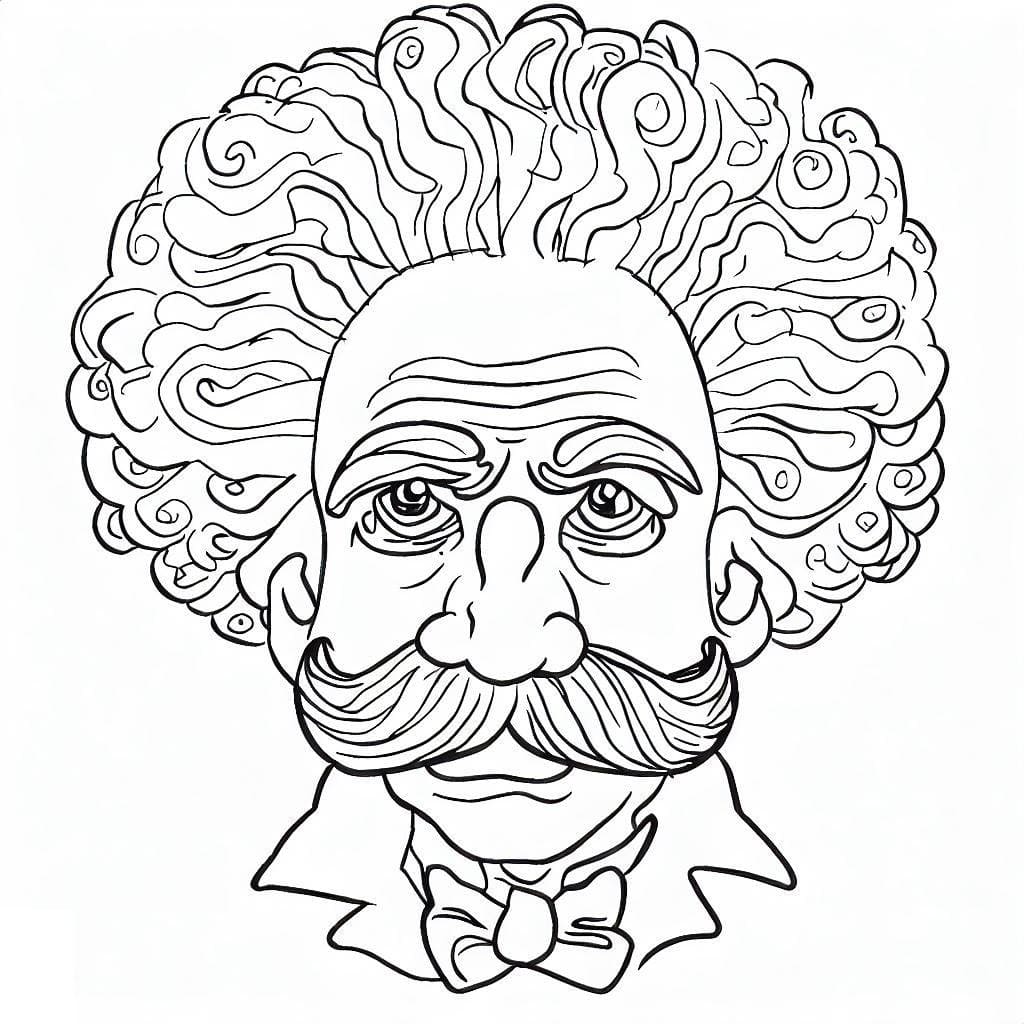Have you ever wondered about the line between genius and something else entirely? People often look at brilliant minds, those who see the world differently, and sometimes wonder if they are, well, a bit unhinged. This thought, you know, it pops up a lot when we talk about folks who truly change things.
Albert Einstein, with his wild hair and profound ideas, certainly fits this picture. He gave us theories that reshaped our view of the universe, but his public image often showed someone quite unique, perhaps even a little odd. So, was Albert Einstein crazy, or was he just incredibly different?
This article will take a closer look at the man behind the equations. We will explore his life, his personality, and the quirks that made him famous, trying to sort out the truth from the myths. It is a fascinating question, really, to consider if his unique way of thinking crossed into something more.
Table of Contents
- Albert Einstein: A Brief Look at His Life
- The Public's Perception: Why "Crazy"?
- Unpacking Einstein's Eccentricities
- Genius Versus Mental Illness: Drawing the Line
- The Power of Unconventional Thinking
- Common Questions About Einstein's Mind
Albert Einstein: A Brief Look at His Life
Born in Ulm, Germany, in 1879, Albert Einstein grew up with a deep curiosity about the physical world. He was not, it seems, a child prodigy in the typical sense, struggling a bit with traditional schooling. Yet, his mind was always, you know, buzzing with questions about light, space, and time.
He went on to develop some of the most profound scientific theories in history, including the theory of relativity. His work changed physics forever, and really, the way we think about the universe. He was, in a way, a quiet revolutionary.
Personal Details and Biography
| Full Name | Albert Einstein |
| Born | March 14, 1879, Ulm, Germany |
| Died | April 18, 1955, Princeton, New Jersey, USA |
| Nationality | German (later Swiss, Austrian, American) |
| Known For | Theories of Relativity (Special and General), E=mc², Photoelectric Effect |
| Awards | Nobel Prize in Physics (1921) |
| Education | Swiss Federal Polytechnic School (ETH Zurich) |
The Public's Perception: Why "Crazy"?
The image of the "mad scientist" often comes to mind when people think of Einstein. This image, you know, it is a blend of his disheveled hair, his seemingly absent-minded nature, and the sheer difficulty of his ideas. People saw him as someone who lived in his own head, more or less, disconnected from everyday life.
His unconventional appearance, like not wearing socks or his preference for simple clothes, added to this perception. He seemed to care very little for social norms, focusing instead on his thoughts. This sort of behavior, you know, can make people wonder if someone is quite stable.
Also, his groundbreaking theories, like relativity, were so far removed from common sense that they were hard for most people to grasp. When someone proposes ideas that challenge everything we believe, it can seem, in a way, like they are speaking from a different reality. This naturally leads to questions about their sanity.
Unpacking Einstein's Eccentricities
Einstein definitely had his quirks, but these were more about eccentricity than any sign of mental instability. His unique traits were, you know, often tied to his deep focus and his way of thinking about the world. He just operated on a different wavelength, it seems.
His Unique Approach to Problem-Solving
Einstein was famous for his "thought experiments." He would imagine scenarios, like riding on a beam of light, to explore complex physics problems. This was his way of "creative optimization" for understanding the universe, generating new insights without needing a lab. He would, in fact, visualize problems rather than just crunching numbers.
He spent hours, sometimes days, just thinking, letting his mind wander and connect ideas in unusual ways. This sort of deep, personal "learning experience" was key to his breakthroughs. He wasn't just following rules; he was, you know, creating them.
His brain, you could say, was incredibly good at processing complex information and making "predictions" about how the universe worked. This wasn't madness; it was a highly developed form of intellectual intuition. He really saw things that others missed.
Social Habits and Personal Life
Einstein was known for being somewhat detached from social conventions. He often preferred solitude or the company of a few close friends. He was not, you know, someone who worried much about what others thought of his attire or his habits.
He had a simple lifestyle, often seen cycling or walking, seemingly lost in thought. His personal finances were not his main focus; he was not one to "budget" or "manage" money with great care, preferring to concentrate on his scientific work. His "account" of what truly mattered was, in fact, knowledge.
He also had a playful side, a good sense of humor, and a deep appreciation for music. These traits show a person who was quite grounded, even if his mind was often in the cosmos. He was, in some respects, just a regular person with an extraordinary mind.
The "Mad Scientist" Stereotype
The "mad scientist" image is a common trope in popular culture, and Einstein, you know, became its poster child. This portrayal often exaggerates a scientist's quirks for dramatic effect. It makes for a good story, perhaps, but it rarely shows the full picture.
His wild hair and somewhat unkempt appearance certainly helped to cement this image. Yet, this was more about his lack of concern for superficial things than any sign of mental distress. He was, in fact, just focused on bigger ideas.
Movies and cartoons, you know, often show him as a quirky, absent-minded professor, which is a caricature. While he was certainly quirky, he was also incredibly sharp and purposeful. This stereotype, honestly, overshadows his true nature.
Genius Versus Mental Illness: Drawing the Line
It is important to tell the difference between genius, eccentricity, and actual mental illness. Many highly intelligent people have unique ways of behaving, but this does not mean they are unwell. Einstein's case, you know, fits this distinction quite well.
What Does "Crazy" Even Mean?
The term "crazy" is a very informal and, frankly, unhelpful way to describe someone with a mental health condition. Clinical mental illnesses involve significant distress or impairment in daily functioning. They are diagnosed based on specific criteria, not just unusual behavior.
Einstein, while certainly unusual, did not show signs of such impairment. He was highly functional, productive, and able to maintain relationships, even if they were sometimes complicated. His mind, you know, was incredibly organized in its own way.
His "account security" of his own thoughts, if you will, was always strong; he could clearly articulate his ideas and defend them. He wasn't experiencing delusions or a loss of touch with reality. He was, as a matter of fact, very much present.
Evidence from His Life and Work
Throughout his life, Einstein consistently produced groundbreaking work, demonstrating clear, logical thought. His theories were coherent and eventually supported by evidence. This sustained intellectual output is, you know, a strong indicator of a healthy mind.
He was able to hold demanding academic positions, engage in complex debates, and communicate his ideas effectively to others. He also played a significant role in public life, speaking out on social and political issues. He was, in a way, a very engaged citizen.
There is no credible historical record or medical diagnosis suggesting that Einstein suffered from a severe mental illness. His "actionable data" came from rigorous thought and testing, not from disorganized thinking. He could, you know, clearly "predict" scientific outcomes.
His unique traits, like his focus and his indifference to social norms, are common among highly intelligent individuals. They are not symptoms of a disorder but rather aspects of a personality deeply dedicated to intellectual pursuits. He was, pretty much, just himself.
The Power of Unconventional Thinking
Einstein's genius was not despite his unconventional thinking, but arguably because of it. His ability to question established ideas and approach problems from fresh angles was what allowed him to see what others missed. This is, you know, a powerful lesson for all of us.
He did not follow the usual path, and that was his strength. His mind was, in a way, always looking for "personalized learning experiences," finding new ways to connect concepts and "generate" understanding. He wasn't afraid to be different, and that really paid off.
His legacy shows us that sometimes, the people who seem a little "out there" are the ones who push humanity forward. They challenge our assumptions and force us to look at the world anew. His ideas were, in fact, revolutionary.
So, the next time you hear someone ask was Albert Einstein crazy, you can explain that his perceived "craziness" was simply his unique genius at work. It was his way of seeing the universe, and we are all better for it. You can learn more about his life and work here, and perhaps explore more about unusual thinkers on our site, or even .
Common Questions About Einstein's Mind
People often have questions about Einstein's mental state and how his brain worked. These are natural curiosities about someone so brilliant and, you know, so different.
Was Einstein autistic or on the spectrum?
There is no clinical evidence or diagnosis from his lifetime to suggest that Einstein was autistic. While he exhibited some traits that might be associated with autism, like intense focus and social detachment, these traits alone do not confirm a diagnosis. It is, you know, not appropriate to diagnose historical figures without proper medical records. His unique way of processing information was, in some respects, just his genius.
Did Einstein have any known mental illnesses?
No, there is no historical record of Einstein being diagnosed with any mental illness. He was known for his eccentricities and a deep focus on his work, but these are not indicators of mental illness. He was, in fact, highly functional and productive throughout his life. His mind, you know, was incredibly sharp until the very end.
What made Einstein's thinking so unique?
Einstein's thinking was unique because he relied heavily on intuition and visualization, often performing "thought experiments" in his mind. He questioned fundamental assumptions about space and time that others took for granted. His ability to simplify complex problems to their core elements was, you know, truly remarkable. He really saw the big picture, often.



Detail Author:
- Name : Ephraim Predovic DVM
- Username : lauren.johnson
- Email : vallie66@yahoo.com
- Birthdate : 1975-05-12
- Address : 569 Bednar Turnpike North Heathfurt, NH 54510-6121
- Phone : 352.266.8571
- Company : Beer-Daniel
- Job : Stock Clerk
- Bio : Nihil animi minima temporibus maiores ut voluptatem. Vel est incidunt voluptas placeat nobis consequuntur. Ex quo rem iure et accusantium rem consequatur.
Socials
twitter:
- url : https://twitter.com/okeynikolaus
- username : okeynikolaus
- bio : Ratione officia nihil nesciunt dolor. Fuga unde tempore sunt magnam autem ullam. Natus quaerat asperiores quae eos dolores unde.
- followers : 1628
- following : 595
facebook:
- url : https://facebook.com/nikolauso
- username : nikolauso
- bio : Sed architecto aut dignissimos.
- followers : 1515
- following : 1647